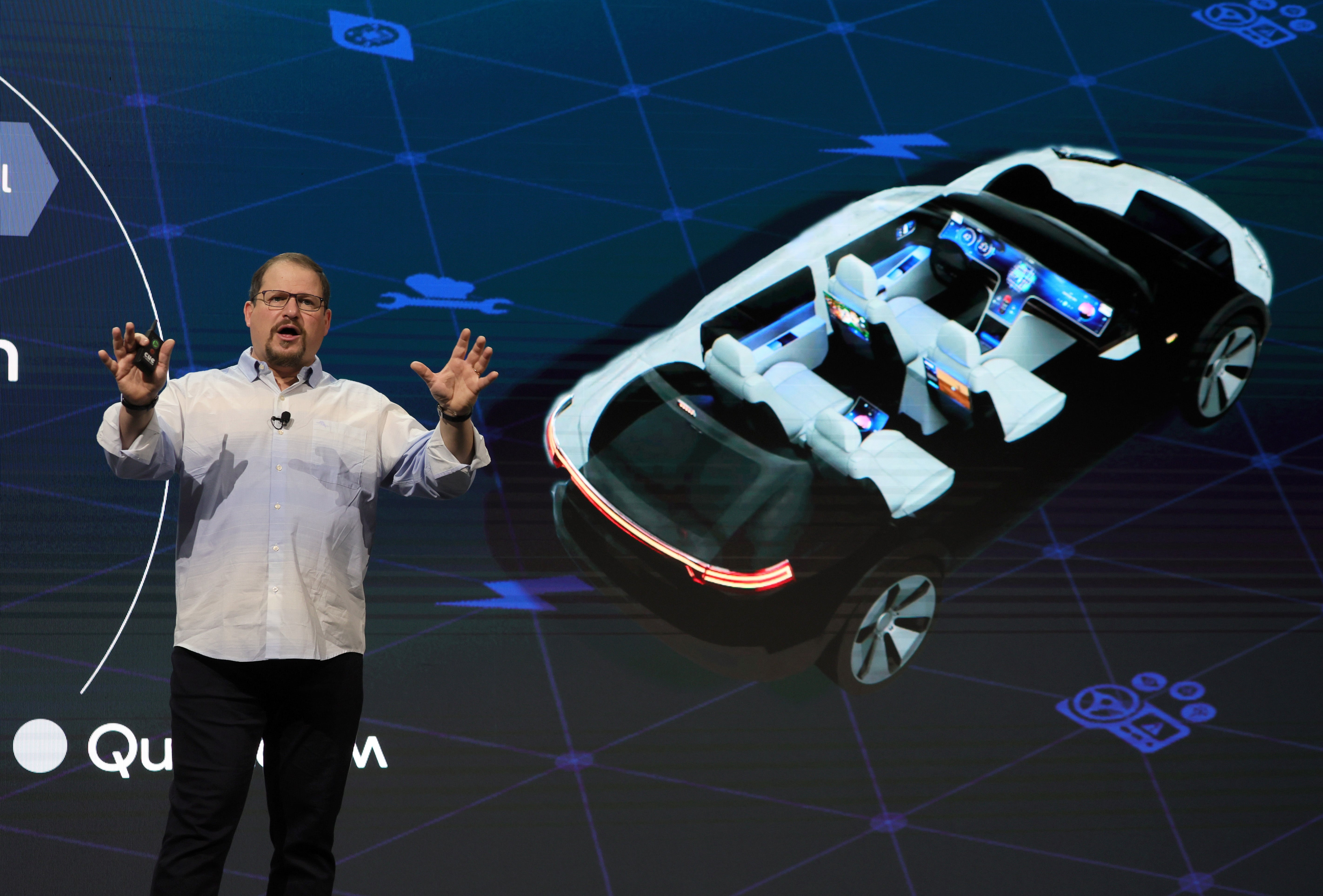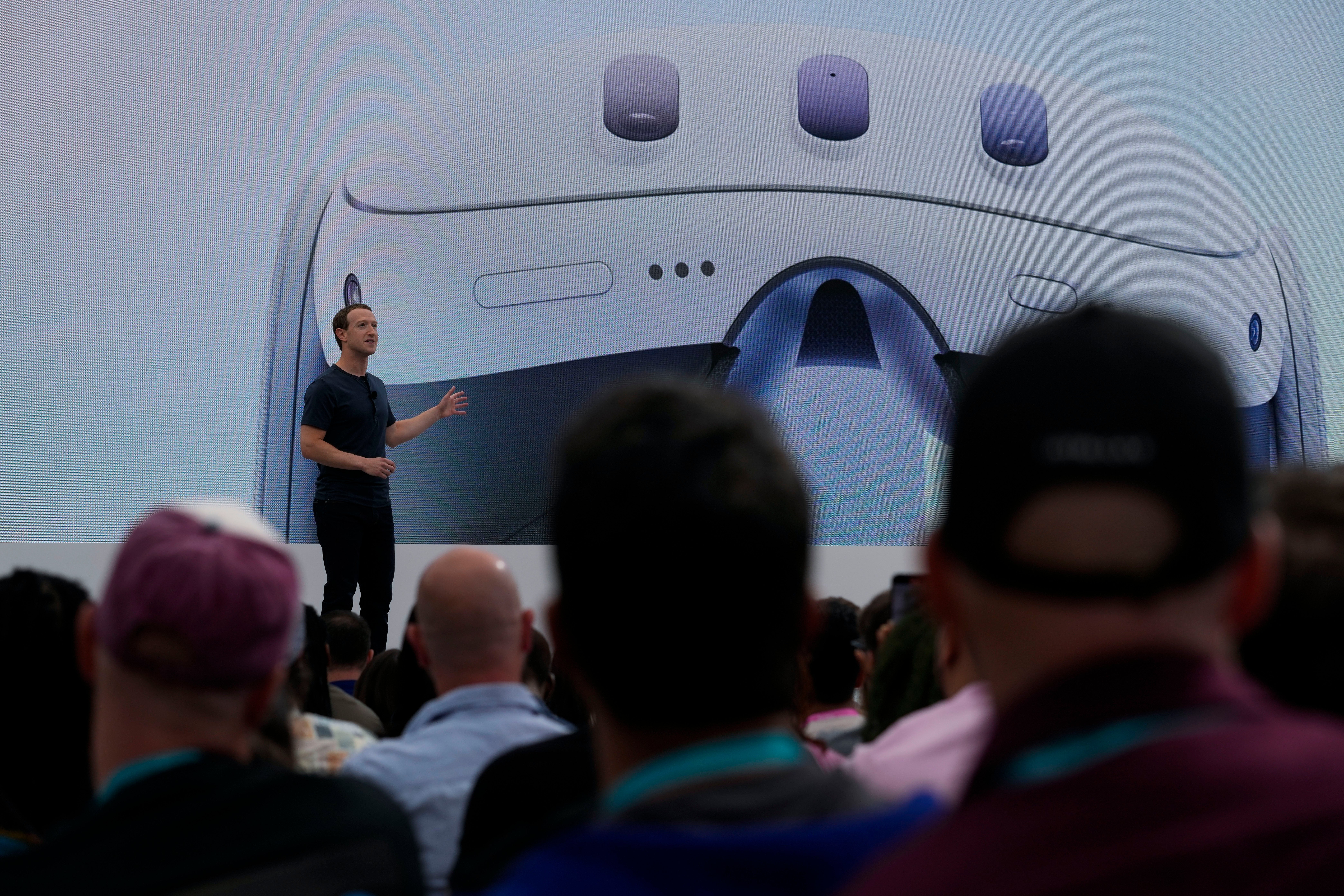How AI is about to change our relationship with phones forever
Generative AI will be able to mine your phone for information about you – offering solutions to problems before you’ve even considered them, according to tech boss Cristiano Amon. He tells David Phelan the smartphone is about to become a whole lot smarter...


Great leaps forward in technology mean the future is coming at us fast – and are about to forever change one of our most important relationships: the one with our smartphone.
That is the view of Cristiano Amon, the chief executive of Qualcomm, the tech giant that produces the processors powering almost every phone in the world, bar the iPhone, as well as laptops and VR headsets.
New bespoke chips will not just be about making your phone faster, or adding new experiences, he suggests. Instead, they will fundamentally change how we use our devices, through artificial intelligence.
Future devices might know that your car is out of service and call you a cab, for instance. Or they might summarise videos without you ever having to watch them.
Amon is a former engineer for Qualcomm, so he’s familiar with the nuts and bolts, the silicon and the strategy. He is relaxed but energetic, fast-talking and concentrated. Perhaps that’s why he’s found a quicker way to say generative artificial intelligence, the major talking point in the tech world.
“Gen AI is enabling this era,” he explains. “It’s a combination of two factors. One is the availability of data so that you can train different models. The other thing that is happening, which is the exciting part for us, is the increase in computing capability.”

GenAI means you can communicate in natural language, Amon says. Then he mentions a product from that company that’s firmly in the news at the moment, Open AI. “When you go, for example, to ChatGPT, put a query in, it runs that model with several billions of parameters and with every word that you get, which is what we call a token, it does a computation, and says, I think that’s the first word and now that I have the first word, what’s the probability of the second one? ChatGPT was a great thing, because everybody in the world knows about Gen AI.”
So, how will Gen AI benefit us? Amon explains, “It helps you to change how you search the internet. Type something in the Google search box and you get a number of results. But with Gen AI, you can just chat with the machine. You can say what you’re looking for and it will answer you in a conversational way, and will get the information based on what’s more relevant.”
Amon has many other examples. Using CoPilot, Microsoft’s Gen AI assistant, you can simply tell PowerPoint you have a document in Word and it can create a presentation from it. But where it really gets interesting, for Amon, is Gen AI that is local to your smartphone, for instance, rather than in the cloud.
“What is different about Gen AI on your computer and your phone is your computer and your phone have contextual information about you, what you’ve been doing, where you are and so on. So, you could give some of those very large models from the cloud a head start.”
This will mean you can think about your smartphone differently, instead of thinking of having to work with different apps. Gen AI can work with them all. “Let’s say that you and I are texting. So, I say, ‘I’m so glad I came to this event. I met this other person as well.’ Let’s say that when you met this person, you took a picture. The AI – at the exact moment that you mention this – presents you with a prompt. It already went to your gallery app and identified the picture.
Gen AI will be the interface between the human and the applications. We’re going to see the next big change in the industry when the cloud and the device just become one
“Now, it asks you if you want to share this picture. The AI is now interacting between apps and the cloud. In the same conversation, you say it would be great if we got together when I’m in London. As soon as I ask if you could meet, your calendar app shows you your available times. Click one and it sends an invite in a different application.”
Amon says these are simple examples but at the next level, things get more advanced. If your car is being serviced, the AI can know that and if it sees an appointment in your calendar, it will ask, “Do you want me to call an Uber for you?” It knows where you are and where your meeting is and the AI, instead of opening the Uber app can go straight to the cloud, direct to Uber, and set it up.
“We’re going to see this change to the app-centric user interface,” Amon says. “Gen AI will be the interface between the human and the applications. We’re going to see the next big change in the industry when the cloud and the device just become one.”
This could mean a big change in attitude from the people using the devices, I suggest. “I think every change in user experience and behaviour will happen naturally if it’s actually helping you,” says Amon. “If it’s just a gimmick, people will do it for a bit and then forget it. But if it’s going to help you, it’s going to allow you to be more efficient, I think users are naturally going to gravitate to that.”
Amon points out that people spend a lot of time looking for files, and Gen AI will help. “Maybe you can’t remember the title of a video. You say to the AI, ‘I saw a YouTube video a couple of weeks ago that talked about this new Boeing plane’. And the AI will have that index and it’ll say, ‘Here’s the video’.”
It’ll do a lot more than that, Amon says. “You’ll be able to take a video and Gen AI will summarise it, in text form. If you think one part will work better earlier, you can drag it. It then recompiles the video and creates completely natural transitions.
“Or you could improve video by taking the er and um noises out and even ensure the lip-syncing stays perfect. What would previously need five hours to do can be done in a minute. This is just the beginning, and it’s exciting to see how many use cases come up as we bring the processing capability to those devices.”

Amon has also introduced Snapdragon Seamless, which allows users to connect different devices seamlessly – something familiar to Apple users, but not available across different phone brands, for instance. “The way we created the technology, we have been supported by Google, Meta and Microsoft, for instance, and it’s been created in a way that even other companies that are competitors to Snapdragon could use it as well,” he says.
Qualcomm also now makes chips for laptops and announced that its latest chip, out next year, is faster and more power-efficient than the Apple M2 Max. It’s a sign of how seriously Apple is taking Qualcomm that it revealed the date of a Mac-related event on the very day Qualcomm held its own chip launch.
When it comes to AI, is he worried about the speed at which things are happening? “We’re excited how fast it’s going,” Amon says. “We’ve been preparing for this moment. If you look at the phone space, this has the potential to create a whole new upgrade cycle. We want the new user experience to be such that you say, ‘I need to get this Gen AI phone’.
“The good thing about the phone market is every person on Earth has one, the bad thing about the phone market is everybody has one. So, you need some significant technology cycles to create a change and we see this as an opportunity to create a new cycle of innovation with this incredible device, the smartphone.”
Join our commenting forum
Join thought-provoking conversations, follow other Independent readers and see their replies
Comments
Bookmark popover
Removed from bookmarks